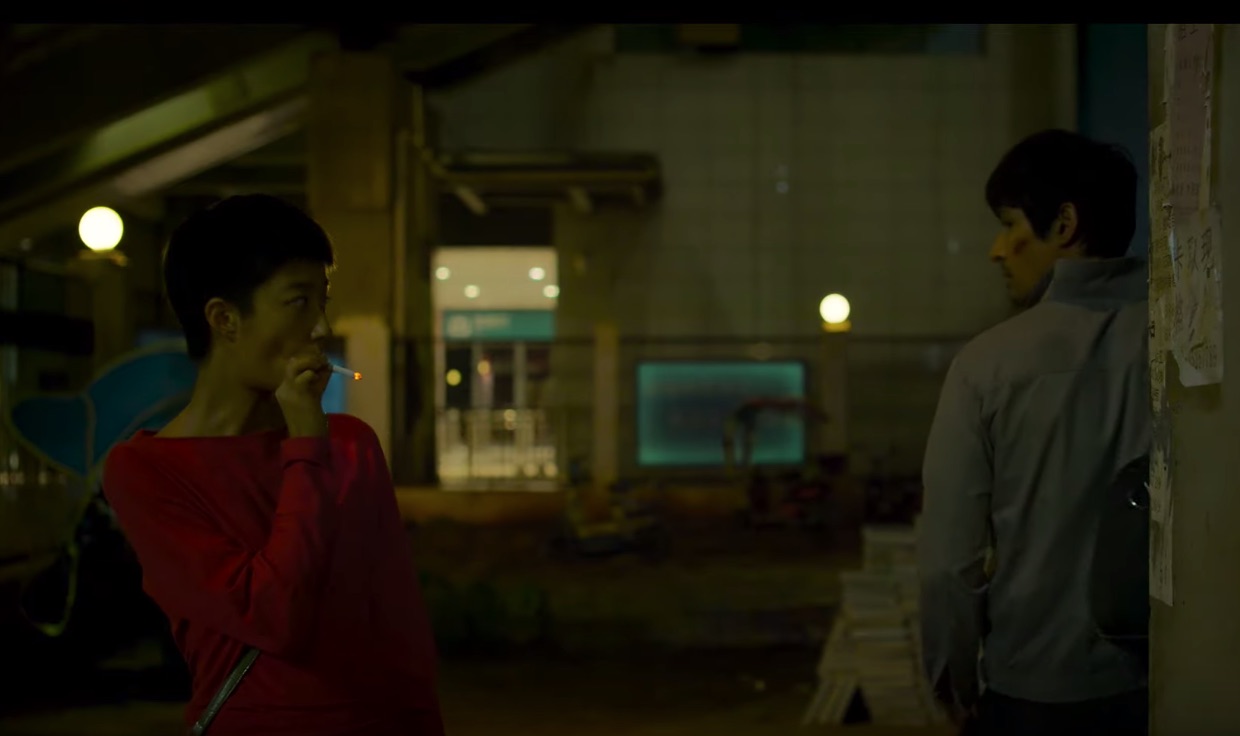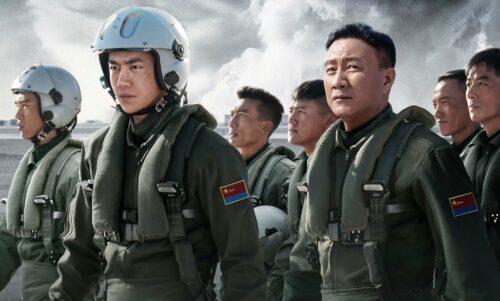‘The Wild Goose Lake’: A grimy, neon-drenched noir from Wuhan

Set in Wuhan — a gritty, weird, flashing city that’s unlike the Wuhan you see in headlines today — The Wild Goose Lake is a pulp noir full of striking visuals and subversive twists.
It debuts in American theaters next month.

Director Diāo Yì’nán 刁亦男 delivered one of the best Chinese movies of the last decade with his 2014 neon-lit mystery Black Coal, Thin Ice (白日焰火 bái rì yànhuǒ). Set in frosty Heilongjiang Province and following a washed-up former cop investigating the serial killer who ruined his career, Black Coal, Thin Ice was a fresh, unique take on neo-noirs. It won over critics at the Berlin International Film Festival, where it took home the Golden Bear award, and put Diao on the map as a filmmaker to watch out for.
It took a while, but his long-awaited follow-up, The Wild Goose Lake (南方车站的聚会 nánfāng chēzhàn de jùhuì), played at Cannes last year, and starting this March will make its way into American theaters.
Like Diao’s previous outings as a director — his early features Uniform (制服 zhìfú, 2003) and Night Train (夜车 yèchē, 2007) were set in the depths of his native Shaanxi — The Wild Goose Lake takes place in a little-seen world, this time in the underbelly of Wuhan, the capital of Hubei Province. Wuhan, of course, is now on the world map, having captured every international headline as the epicenter of the COVID-19 coronavirus outbreak. It currently resembles a ghost town due to a citywide quarantine entering its fourth week. Needless to say, Diao’s Wuhan isn’t like that.
The movie opens on the kind of rainy night mandated by classic noirs, as motorcycle thief Zhou Zenong expects his wife Yang Shujun at a train station. In her place, a woman named Liu Aiai arrives instead, sent by Zenong’s boss Huahua. Aiai reports that Shujun couldn’t make it, and puffing on a cigarette, asks if Zenong really is who he says he is. Zenong gratefully provides a flashback so there isn’t any doubt.
Two days earlier, Zenong went to a hotel for a meeting of motorcycle thieves. After the syndicate’s bigwigs assign territory to the different groups, an argument breaks out between Zenong’s gang and another for a certain street. Words are exchanged, one of Zenong’s men shoots a guy from the rival party, and a chaotic, dimly-lit brawl erupts in the hotel’s basement. To ultimately settle the dispute, a higher-up calls for a competition between the two gangs. Whoever can steal the most motorcycles in two hours will win the coveted street. The plan doesn’t go as it should have. Zenong loses an underling, accidentally shoots and kills a police officer, and winds up with a bounty of 300,000 yuan ($43,000) on his head.
Suddenly, everyone’s looking for Zenong. The police want revenge, and his fellow criminals want the reward. On his end, Zenong thinks he can make the best of this warped situation. If he can get his estranged wife to turn him in — or have somebody act on her behalf — Shujun will have money to provide for her and Zenong’s kid. Aiai is interested in helping, but she appears to have her own motives. She works as a “bathing beauty,” a prostitute, on the beach of the lawless Wild Goose Lake. As the authorities hunt across town for Zenong, and gangsters follow his trail, and a whole lot of backstabbing, twists and turns, and convoluted plot points ensue.
As it meanders through dark streets, dingy buildings, and endless neon lights, The Wild Goose Lake is a fun and unpredictable chase. Although fictional, the lake town feels very realized. The cast speaks in the Wuhan dialect, there are non-professional actors playing minor and background characters, and Diao based some plot elements on actual events, like the bizarre criminal conference at the beginning of the movie. Within this sense of realism is an absurd sense of humor that also borders on the surreal. In one such highlight, a crowd of people with light-up shoes awkwardly dance to “Rasputin” and other goofy tunes before a shoot-out breaks up the party. A scene at the end, involving a fight with an umbrella, will also surely go down as one of cinema’s greatest impalings.
Other satirical touches come at the expense of the Chinese police. Officers admit that they don’t know how to use a gun, and others happily pose for a selfie with a man they’ve just shot down. As the authorities run around in plain clothes, it’s hard to distinguish them from the criminals participating in Zenong’s manhunt. Like its predecessor, The Wild Goose Lake has a sociopolitical edge. While the movie as a whole is faster and more vigorous, it doesn’t quite pack the same punch. At points, it has a habit of dropping off and losing focus. Its anti-heroes, although intriguing and likeable enough, don’t feel fully developed, either.
Perhaps the strong style sacrificed some greater substance here, but it’s still hard to argue that The Wild Goose Lake isn’t a worthy successor to Diao’s earlier knock-out. The atmosphere is perfectly grimy and the set pieces, like a nightly motorcycle race that ends in a decapitation, are wonderfully constructed. The movie knows how to play its genre cards just right, twisting and subverting the usual tropes to make a beautifully ugly thriller. The Wild Goose Lake might stumble in some steps, but at the end of the chase, it exceeds with its thrilling action, clever quirks, and striking visuals.
Film Friday is The China Project’s film recommendation column. Have a recommendation? Get in touch: editors@thechinaproject.com





